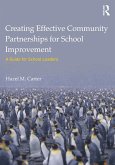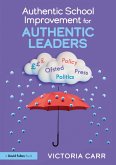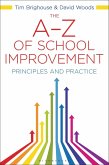26,95 €
26,95 €
inkl. MwSt.
Sofort per Download lieferbar

13 °P sammeln
26,95 €
Als Download kaufen

26,95 €
inkl. MwSt.
Sofort per Download lieferbar

13 °P sammeln
Jetzt verschenken
Alle Infos zum eBook verschenken
26,95 €
inkl. MwSt.
Sofort per Download lieferbar
Alle Infos zum eBook verschenken

13 °P sammeln
- Format: PDF
- Merkliste
- Auf die Merkliste
- Bewerten Bewerten
- Teilen
- Produkt teilen
- Produkterinnerung
- Produkterinnerung

Bitte loggen Sie sich zunächst in Ihr Kundenkonto ein oder registrieren Sie sich bei
bücher.de, um das eBook-Abo tolino select nutzen zu können.
Hier können Sie sich einloggen
Hier können Sie sich einloggen
Sie sind bereits eingeloggt. Klicken Sie auf 2. tolino select Abo, um fortzufahren.

Bitte loggen Sie sich zunächst in Ihr Kundenkonto ein oder registrieren Sie sich bei bücher.de, um das eBook-Abo tolino select nutzen zu können.
The Gradual Art of School Improvement is a comprehensive practical guide to school improvement, covering aspects such as improvement planning, staff development, the learning environment, dealing with outside pressures including inspection, curriculum design and the role of leaders at all levels.
- Geräte: PC
- ohne Kopierschutz
- eBook Hilfe
- Größe: 1MB
Andere Kunden interessierten sich auch für
![The Gradual Art of School Improvement (eBook, ePUB) The Gradual Art of School Improvement (eBook, ePUB)]() Richard StewardThe Gradual Art of School Improvement (eBook, ePUB)26,95 €
Richard StewardThe Gradual Art of School Improvement (eBook, ePUB)26,95 €![The Contentious Politics of Higher Education (eBook, PDF) The Contentious Politics of Higher Education (eBook, PDF)]() Lorenzo CiniThe Contentious Politics of Higher Education (eBook, PDF)41,95 €
Lorenzo CiniThe Contentious Politics of Higher Education (eBook, PDF)41,95 €![Creating Effective Community Partnerships for School Improvement (eBook, PDF) Creating Effective Community Partnerships for School Improvement (eBook, PDF)]() Hazel CarterCreating Effective Community Partnerships for School Improvement (eBook, PDF)48,95 €
Hazel CarterCreating Effective Community Partnerships for School Improvement (eBook, PDF)48,95 €![Authentic School Improvement for Authentic Leaders (eBook, PDF) Authentic School Improvement for Authentic Leaders (eBook, PDF)]() Victoria CarrAuthentic School Improvement for Authentic Leaders (eBook, PDF)17,95 €
Victoria CarrAuthentic School Improvement for Authentic Leaders (eBook, PDF)17,95 €![Indonesian Education (eBook, PDF) Indonesian Education (eBook, PDF)]() Christopher BjorkIndonesian Education (eBook, PDF)56,95 €
Christopher BjorkIndonesian Education (eBook, PDF)56,95 €![Managing Complex Change in School (eBook, PDF) Managing Complex Change in School (eBook, PDF)]() Alejandro Salcedo GarciaManaging Complex Change in School (eBook, PDF)29,95 €
Alejandro Salcedo GarciaManaging Complex Change in School (eBook, PDF)29,95 €![The A-Z of School Improvement (eBook, PDF) The A-Z of School Improvement (eBook, PDF)]() David WoodsThe A-Z of School Improvement (eBook, PDF)26,95 €
David WoodsThe A-Z of School Improvement (eBook, PDF)26,95 €-
-
-
The Gradual Art of School Improvement is a comprehensive practical guide to school improvement, covering aspects such as improvement planning, staff development, the learning environment, dealing with outside pressures including inspection, curriculum design and the role of leaders at all levels.
Dieser Download kann aus rechtlichen Gründen nur mit Rechnungsadresse in A, B, BG, CY, CZ, D, DK, EW, E, FIN, F, GR, HR, H, IRL, I, LT, L, LR, M, NL, PL, P, R, S, SLO, SK ausgeliefert werden.
Produktdetails
- Produktdetails
- Verlag: Taylor & Francis eBooks
- Seitenzahl: 206
- Erscheinungstermin: 13. Juni 2019
- Englisch
- ISBN-13: 9780429650680
- Artikelnr.: 56985426
- Verlag: Taylor & Francis eBooks
- Seitenzahl: 206
- Erscheinungstermin: 13. Juni 2019
- Englisch
- ISBN-13: 9780429650680
- Artikelnr.: 56985426
- Herstellerkennzeichnung Die Herstellerinformationen sind derzeit nicht verfügbar.
Richard Steward is an educational consultant with 16 years' experience as a head teacher. He has taught in a variety of schools in a 30-year career and has worked as a part-time lecturer with The Open University. He regularly publishes articles in the educational press.
Acknowledgements Introduction 1. Creating a Learning Culture Acceleration
Quick fix versus slow burn Towards a definition of a learning culture
Beyond the classroom Politics Avoiding distractions Head of teaching and
learning The headteacher in the classroom Behaviour for learning Open
classrooms, open leadership 2. Leadership for Learning The myth of the hero
head Leaders as teachers Working with the system Innovation Two examples
The leadership team The whole team Appointing leaders The digital leader
Improvising 3. Real Improvement Planning The vision The self-evaluation
form What should a SEF include? What to include in a learning plan An
example plan The learning plan cycle Line management Embedding the plan 4.
Staff Development Teachers as researchers Trios Challenge coordinators
Classroom to classroom A planned programme Departmental reviews Reluctant
staff Staff forum Teaching schools 5. The Curriculum What do we mean by the
curriculum? Playing the game Broad and balanced Choice Standing up for the
arts Vocational education Putting it all together The importance of
narrative 6. The Myth of Governance The role of governors Who are the
governors? How qualified are governors? Governance in practice New
governors Reporting to governors The importance of policies Critical
friends Inviting governors into school Accountability and trust 7.
Inspection The need for inspection The dangers of being satisfactory The
dangers of being outstanding The limitations of inspection Preparing for
inspection Over-preparing 8. Pupils not Systems The alternative school
council Teaching and learning and the school council Pupils as leaders of
learning Parents Academic pupils, happy pupils Endnote Index
Quick fix versus slow burn Towards a definition of a learning culture
Beyond the classroom Politics Avoiding distractions Head of teaching and
learning The headteacher in the classroom Behaviour for learning Open
classrooms, open leadership 2. Leadership for Learning The myth of the hero
head Leaders as teachers Working with the system Innovation Two examples
The leadership team The whole team Appointing leaders The digital leader
Improvising 3. Real Improvement Planning The vision The self-evaluation
form What should a SEF include? What to include in a learning plan An
example plan The learning plan cycle Line management Embedding the plan 4.
Staff Development Teachers as researchers Trios Challenge coordinators
Classroom to classroom A planned programme Departmental reviews Reluctant
staff Staff forum Teaching schools 5. The Curriculum What do we mean by the
curriculum? Playing the game Broad and balanced Choice Standing up for the
arts Vocational education Putting it all together The importance of
narrative 6. The Myth of Governance The role of governors Who are the
governors? How qualified are governors? Governance in practice New
governors Reporting to governors The importance of policies Critical
friends Inviting governors into school Accountability and trust 7.
Inspection The need for inspection The dangers of being satisfactory The
dangers of being outstanding The limitations of inspection Preparing for
inspection Over-preparing 8. Pupils not Systems The alternative school
council Teaching and learning and the school council Pupils as leaders of
learning Parents Academic pupils, happy pupils Endnote Index
Acknowledgements Introduction 1. Creating a Learning Culture Acceleration
Quick fix versus slow burn Towards a definition of a learning culture
Beyond the classroom Politics Avoiding distractions Head of teaching and
learning The headteacher in the classroom Behaviour for learning Open
classrooms, open leadership 2. Leadership for Learning The myth of the hero
head Leaders as teachers Working with the system Innovation Two examples
The leadership team The whole team Appointing leaders The digital leader
Improvising 3. Real Improvement Planning The vision The self-evaluation
form What should a SEF include? What to include in a learning plan An
example plan The learning plan cycle Line management Embedding the plan 4.
Staff Development Teachers as researchers Trios Challenge coordinators
Classroom to classroom A planned programme Departmental reviews Reluctant
staff Staff forum Teaching schools 5. The Curriculum What do we mean by the
curriculum? Playing the game Broad and balanced Choice Standing up for the
arts Vocational education Putting it all together The importance of
narrative 6. The Myth of Governance The role of governors Who are the
governors? How qualified are governors? Governance in practice New
governors Reporting to governors The importance of policies Critical
friends Inviting governors into school Accountability and trust 7.
Inspection The need for inspection The dangers of being satisfactory The
dangers of being outstanding The limitations of inspection Preparing for
inspection Over-preparing 8. Pupils not Systems The alternative school
council Teaching and learning and the school council Pupils as leaders of
learning Parents Academic pupils, happy pupils Endnote Index
Quick fix versus slow burn Towards a definition of a learning culture
Beyond the classroom Politics Avoiding distractions Head of teaching and
learning The headteacher in the classroom Behaviour for learning Open
classrooms, open leadership 2. Leadership for Learning The myth of the hero
head Leaders as teachers Working with the system Innovation Two examples
The leadership team The whole team Appointing leaders The digital leader
Improvising 3. Real Improvement Planning The vision The self-evaluation
form What should a SEF include? What to include in a learning plan An
example plan The learning plan cycle Line management Embedding the plan 4.
Staff Development Teachers as researchers Trios Challenge coordinators
Classroom to classroom A planned programme Departmental reviews Reluctant
staff Staff forum Teaching schools 5. The Curriculum What do we mean by the
curriculum? Playing the game Broad and balanced Choice Standing up for the
arts Vocational education Putting it all together The importance of
narrative 6. The Myth of Governance The role of governors Who are the
governors? How qualified are governors? Governance in practice New
governors Reporting to governors The importance of policies Critical
friends Inviting governors into school Accountability and trust 7.
Inspection The need for inspection The dangers of being satisfactory The
dangers of being outstanding The limitations of inspection Preparing for
inspection Over-preparing 8. Pupils not Systems The alternative school
council Teaching and learning and the school council Pupils as leaders of
learning Parents Academic pupils, happy pupils Endnote Index







